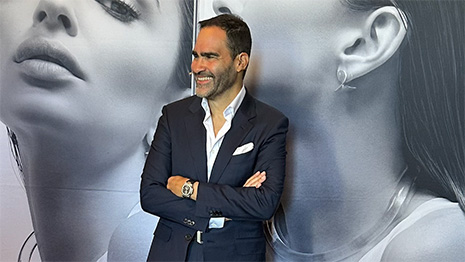By Daniel Langer
In the rapidly luxury market, a seismic shift is underway. Gen Z, the digital natives born between 1997 and 2012, are not just entering the luxury market, they are redefining it.
I have been advocating for years for brands to adapt early to this new reality and overindex with the next generation, but many managers thought they had time. And for many brands it may already be too late unless decisive action is taken.
By 2030, this cohort, along with millennials, will represent between 60-70% of global luxury spending. Yet, many luxury brands remain widely unprepared for this new reality, clinging to outdated strategies and communication methods that fail to resonate with the next generation of wealthy clients.
The disconnect between luxury brands and Gen Z is stark and growing. While these young consumers seek authenticity, inspiration, and social media-first experiences, many luxury houses continue to operate as if Instagram were cutting-edge technology. This gap is not just about social media presence, it’s about fundamentally understanding and adapting to a new set of values and expectations.
Gen Z’s approach to luxury is radically different from previous generations. They value experiences over products, sustainability over excess, and authenticity and genuine care over traditional notions of exclusivity. A staggering 85% of Gen Z consumers are willing to pay more for products that are socially and environmentally responsible. Yet, how many luxury brands can genuinely claim to meet these standards?
The reluctance of luxury brands to fully embrace social selling is perhaps the most glaring example of this disconnect. In an era where Gen Z discovers and connects with luxury brands primarily through platforms like TikTok and Instagram, the industry’s hesitation to engage in these spaces is nothing short of existential threat. Brands that fail to master social selling and create authentic, engaging content for these platforms risk becoming irrelevant faster than they can say “traditional marketing.” Just look at China, which is 3-5 years ahead of the rest of the world in digital and where now more than 100 (!) million paid influencers connect brands with clients.
Gen Z’s priorities extend far beyond shopping habits. They are spearheading a lifestyle revolution that luxury brands must understand and cater to. Gen Z views mental health as equally important as physical health. Luxury brands must recognize that for this generation, wellness is not a trend but a fundamental aspect of their lifestyle. How are luxury experiences being tailored to support mental well-being?
The concept of luxury is expanding to include health and longevity services. Gen Z and Millennials are driving a shift towards “everyday luxury” that prioritizes quality, sustainability, and wellness and they are willing pay significant price premiums.
As many emphasizes experiences, connection and health, luxury brands must reimagine how they engage with young consumers in social settings, moving beyond the champagne-and-VIP-room model to create more meaningful, diverse experiences.
The luxury industry stands at a crossroads. Brands that fail to adapt to Gen Z’s values and expectations risk not just losing market share but becoming entirely irrelevant. This is not about minor adjustments. Rather brands need to fundamentally reimagine what luxury means and how it’s delivered. Importantly they need to define what is their role in the life of their clients through much better storytelling and in-depth, transformational training.
Gen Z demands to know where products come from, how they are made, and what impact they have on the world. Luxury brands must embrace radical transparency or risk losing trust. The line between physical and digital is blurring. Important is excellence and consistency in brand storytelling, from product to channels to experience. Gen Z wants to be part of the conversation, not just passive consumers. Brands must find ways to involve their young clients in the creative process and build genuine brand communities around their values.
The message to luxury brands is clear: adapt or perish. The next generation of wealthy clients is here, and they are speaking a language many luxury brands have yet to learn. It’s time for the industry to step out of its comfort zone and embrace the radical changes necessary to remain relevant in the Gen Z era.
The future of luxury will be defined by those who are able meet Gen Z where they are and create new paradigms of value and exclusivity. For those unwilling or unable to make this leap, the writing is on the wall or more accurately, the TikTok video is already viral.
Luxury Unfiltered is a weekly column by Daniel Langer. He is the CEO of Équité, a global luxury strategy and creative brand activation firm, where he is the advisor to some of the most iconic luxury brands. He is recognized as a global top-five luxury key opinion leader. He serves as the executive professor of luxury strategy and pricing at Pepperdine University in Malibu and as a professor of luxury at New York University, New York. Dr. Langer has authored best-selling books on luxury management in English and Chinese and is a respected global keynote speaker.
Dr. Langer conducts masterclass management training on various luxury topics around the world. As a luxury expert featured on Bloomberg TV, Financial Times, The New York Times, Forbes, The Economist and others, Mr. Langer holds an MBA and a Ph.D. in luxury management and has received education from Harvard Business School. Follow him on LinkedIn and Instagram, and listen to his Future of Luxury Podcast.
{"ct":"L6QSovyCJUyAntGYlMmeChlIDSNc+CuWdFaY6VKmOA1DQ9bTQBPXP2w9y3XbEsIlETUQZGUzTpUoZleQWkcHJchV\/6WpQxshoRLMbKoedqXMhZ2NGiZgQs\/Pb4Q3UdHc3awAi5osjZNuiY\/T0TwCYRrx3Fde\/GyQqppEEng45FYysojAuAyB4nhx37Sk5+1c5Tt5TDBeBrNrdge3eOZzcv4pYTLWd4fsSXPVkzgPSPtEskgWjYDU6MgrD4IKxo+5NOBEG7MG9zgM6KwPkVRE66tchntoB67+q+vIZZkrFfDy8jJX6ncLQRMyZ7ai\/sAUu9dQD0KYFUcsg4vkqqr\/O+qaH1h5vK0lG41Slnd2hiUAvng3pvGNbifnSe10I5QYRX40BpTPJjyaanIywTmcD1hl7\/l+nzPPhOG5XMsv\/VWd49jBWo45YikcgZZRl5lo3y2c3vDZ9VIeuLQnp9jK+GVkiLpv4rjqG+x3dvWT4d8Q2KXyRVNdtX3P9D2+vEYsfQBdSH7WTpogxg3laJUtH4YQcokJXrwVt+I66SjuMQn2sWxCNgJ4EJwso4rfdUJiEl1TwkNYyINENIw7139PM8SRc+dZukioV0CL4fEqKqO8VM4hTHLpBCVIbY8X9yEiyyRDuWwNibWTd4hewWVeja5hWH+bK2a9EcdPKHWbU9TpIB6OfBXL2NM3I+ILOP+4saIlXQIst8FRa0GbaRFlBZcjRaf8VbtNo+COQKHJN5Ob0W3jb8anLdVNsz2gewDt2mmgOVgY4W\/2TSxFXiDIkTVAI8wqaWuo53risZV8n4+qf8aFpfOw95NsnKUzAdE5xK+Xy2xDgCgi3sqty6wFYPhQiLQLHC1ehzq7jlQrF9+7io4zWHxbOtsDbLNOdEn25erDOn\/4ipDsgpdYyt064\/+0a8qO0gKsUHBuukPSnLFlDxwWIgPUl7YcACfFhG9Er4QYkJBglHvPcTUATG842VJg\/fot1fUdAVYBB74Dp\/wxbxPLpD5gDXVEHs20gbW1wx8AJm8exw6OFi5zeGcqZBa\/qUPzizwBTQwqTqwo6LvPh4cPrhLko5DOLC1aW7rWLF73vcDLRF8mUQrnkMYZIc90rU3EgKTbeJt07kjUhkXPAhL\/QO1CDiQhbuB8eLVJ9wEflIdi0XNSUr3Far9ZlCE3iH878Dq42zJ5iyLE42xo54iIYs5xBJl9rgV+GaVc0oeGGs3HI1vqW6GRsGrquV\/\/FdNMWA4hSn2i7gjkq9HTRS5zCGnZTSVOMApt6Z9puO6hG3PX9w5hMU6gXIlq9\/XAt+9\/6a7z0ZHkzGjAR9hMwP78HhGAaaJeLBeUtqsVX6mdwT3Mz1AZUhkBjyZwgZQwWfUmFaLl530n3OQ3igHlGxUVb5N591K3zLPpQZvLd8vUnAY9ykwvn1JzDSsaSGZyJ6g+p5is79wXOogsz4XDjKLvIdL2x3eR0Xo00WAci8AHHW55ej5iAzFMpJwmtZLzvpfKaORXQAlMenZAMRtLiZHPnXlv1s2YbkbMkIdi2CSaXOD5VrKu8sFVn89tZ6vcyqwhDUm0820v6ud7ZPy2S4EPw4x68yAWQHDRvZ3s3xDbemGZlfflyQiUnREZX7jTEbMpTal8e9h8n\/Cd\/Zx\/icW3UqxnXYuPTQ38seusXtiy\/Pg4UaJ30nKqe8w3kluYm+Pj8uZQgEf8S1ydcPAUq9WETgyXfkq8dft6O8q2v9y6ZZYkAfQp+swOsPYFiv40mR5vgu97ld4SgehiZbdQvM6s6LBCAgNBBcO+bcEqbaexEKssqCXMaE2\/N5CiwYiyegGrNRYWsdPgnB2kcDYz5b+anvIg5DZjQeywc7yP+ywdn8D19xOwezNFcGRjasJ29\/ngHKM4E4\/MbveORfX8uro1XP8MwrL2SP5KyvKdsNsVTRUa5JAtmvYkiTyvUe1bdLphmj6e+PL1Kp+XSie+iQF6YAKzANAkkg81liJjjoduD3HfLDyVB4bqRcDynAvseoYKvJzJeHM17fmj9rXlfROmcjaRFsESqXhAo7fHDnVSNtbH3mxa7ZUb9zD8Y6O3g+Gyz6WPTIxBowXGuWjhINlSpo0Ou8grB078KVKsdsGK1ZD+0CTHvABg5vLV39NtNyoa9mc563kJoNGAmNL6A5qcgqJIVuTai0RpC1fYK27t5Q3TISDOfjGSeIxEHTgOHNjkDVumUpkhsgCBlyNk059W\/tFHxsWvTg7L4RbDWuD1L\/clYoyIkKdm0EP\/hCQy5FMDPwDMXDw\/cIq4Mw+6Qe80g6tUDPGrFOVD1r2zaL\/JyQD9KC0A2DlN2OF7uzGAY0N7\/bFhXkGya9QCwPOkvDSXjNADLuRgo8N6+zEt5mSrsiC6r8seukOnYBN0vi7xlpCfJ6k8iaHo3MVXvMYArAdoDxdSLVcz5ydvrA6jEa9JKAtkxXmDxIkFvyGv4UB8MCTkb1xNtw9JzGsOg5Sicp+r042XxE4DSN7gUiK6icbNHA\/iv\/XyMRqqYI8QPiZ0HHNeQ62PBDvgIo+NwL6CiuynTxhfn9G9wa6tbGrp4vNW4gUEHCu86nNdsiphyjAbk39HgnTUUIsoZnntNJ8HDn5oMXfC2aaynI0RzRLzVDrE5MGgSnG6QsBihQuaKOjhAilq0azUjfyo09GTqGQexeXnJQLXSEa7K8ZlezMnpTW+REsaGTqvKtYYrjQTztniohgkUahKz4jN+t3pay33uQE01Rc\/y2WU9WsJ2GNhkORbcEM\/n07FJtcgnbqA5J4abRIOwLIfuw9VOf2gv\/TWCGb952DxDs\/01WOWTTOsSvFsPSfQ9EJyjQJmFs59zNXw33qdPsHqnWSv\/6BQ6CfHumeS+SaxMYkLckPcMymaFj6oIia7Y+WEYBOuDlzb86FUn1TOAI\/QfmjPhsczwq0mB1D7FU0JJKBCrOo11fFszkPEIGtptdG95dSyQ+c7I1Kk\/foR6YERCQZlSf+M75cTJjlLQvA4+\/Aazhh7YkWCClqFIcEp\/mOoKJ57Pp5+13ZF4XHTo3yLZLr1XMk70t5a3j4\/5nlNZNng\/j0+e1R5z1jN8+SM0WA9W\/wwg1NpXL44JiiDSTTx6NOHQpfewNPtenxVY4pTTKb0ddjlOIYkMZqdAY2YObmt+SZcjE98IwUV9I4pphxT8hmEv5Ei9u39StV82QOrLwB5HTfPsf\/dllgl2oNdNeQDr2HcvOHtn9EW0Hde9V9UAPZeLz1tXSW0rYYpCy1SdJVtSgZuOky4tNp6TBJCz8+fU\/5QSBaFD7Wu8P\/4ZiCp+9B9ugZF\/uyyaOoA05P\/C+FfxuN3glc3nLH7cMddFlGUZCnc\/s8yAdDcdi23i\/XBczF4PnZkb1MxNIss\/fu8NBrJPz1nX4hSJUYnp2qp6Ga5FJOYoAjmoP1IS1C93PJZrdZfj+zdGYOkNEI\/T6bkmvR4Up0dGArBh7d\/mleJi9jyvTmP7467PtgxaQUvVfm23cAjXy+yyQNxw871CcYgScL4qOypuha6rxCaDmCI4W3doyrpFWVK7Skx5WG+6qswe+Q13u8K58BwpKVDD7NMQImW\/OJMt2bwg4sATryTkA\/aWAXbJqV4LlsEP5NSpBJKUhNt5+1NE\/+kxFyM3CXTx1sYCMTiwEeiOrYuz5PL7n3E6QoPvZG9kgwIjnjMiO+Xyo9qQ0\/k0mPvzq4LnzvcJ0uwVk\/0pQzdu+8nOWUpxVZV2yC\/CsScmvNmsSOLXEhI0lINYFx+E0apFpt2O1YpDUn9JJB77OCb7YOMzQ70t6+\/nGPhF3hqLEF0WuKDea63Go7xiWN4WUmnddH9XZKAk8UnEPwkovvmbhdHgYmM4y6BMb7u\/bWRhKv2+m\/PDriol7vp2uTdDRJBKyTcxLKX\/prKhml8TtKJi0pJKz89yIL2UNs5bSGPzDKU7fu1c+Eix\/q+OtlL9UEvaWIIAyLDZjQF\/wa4h2GE1l41xoBK2UVSv8Xkqa4xiopM9vA0MEu+pS8UkrVjeKDFH00iDFElt43ZM0TeEtMzYu8oTk\/zZowz6hXp0QBpKJTmrTXK6vBQ+Dg\/n4WtHJj5U\/tKehXMxAnJLsRrUeaxcivdiyuI6G105jnZSMy5jqvlxsYufm1zsNBJNv7w5nTfflf3KtUZpLQzT+730C845o1QOGPZ+OWodkz57lObaYmUyHIDgJg4z4GJKnXa6gSLVsEMfwHaCQbN7MEGpohw\/t+Zh9nQ5MQ6OF356UmMUBMDBb5aBUMsiwkBGcbd8IV52rlSHN\/MHiCnIkxwkm6WMvtonbjjaLQCIdHnc6xZID38yc8nH+JF7+63xP+FkvRZkn\/IVdCoF9jzZWK3ZUTC6\/6mnxNPXdyWVvJ0JK+au3FK8Z7WGaemXYEuGq2idewla+2EglankVjSCP\/JcI5qFlgQW2w2cFsJHWGh+EhsmR6rhVaPgmKPkxTClZXK8bNFX8Q1vy3j9e1zEzip8gx6ULOjCb\/YQ2zjxGomLQoV\/2pFvODS36ttZQ2rzKFY6MsLKW5UCmU4vwZWL487cgzxic93+huJDNpmXPM6QMgf2kpz+mq1dflXCROXTPVs6eYNWG7KvJvxYt5kLew9XsbY6AvUrwknhltn91cFTVN2hLL7O+yy9gSCw3fYR67rzcCz4BUfVzqatWJoWkx4UrTHGGtEU7u8Qhk35lswKKf\/l3ZBfOCdw9Bk8sTHVDLkDE2\/G44SNf4Xl+Dq8QbLZspJhqTHm0yLXnxrfmRKwW4KvFDoPSaxT2Dyzget\/uU+8uoW8v\/f6smbLsqbNxBcjQZf4l4AUgpVDwoGVnkpX5uowUkSZ7bN+Cb23PKw\/yQvoL6702A5dXrb61J03y40C3qatbdG34vhgUyhEC\/ZXLtmqE1i2ZLKbitHXH4l5Xkg+0FTmti0jmjmUTKP66AcIrGK4+7BdYDNAQ4bVpCO+Mb\/rsfglp52vDLu0L9bVKNF+huKkz3eUkO1ZuFRxU05kn639AG98z2+t0p5heQlUm+YxH8qoQHoIu8xHUAfywvM06Di8jcf6jpqPjnNT9+nv6tSeAnIzyzKxlj43lVaRWevJb55RVQxjJhW8EsHgz\/o4zlIy\/N9w+UQNfaP0qTLdtQyVp9HUSzy70pPxEd6qeRzfnmitQOUVMwQjPofkWA3R9Qq7ABHWX4+i+YY5mQKifVw7Kz\/Bya2S2COm5jlrNwqL4u+kQ7b8ltjdYbWg\/6kdil15E2ZVYsHchYi3NMjt8rTAzF2XclWojKUqgtbi6LAvyc\/RCipFGUfnOGAlxIDURvt7HrBeAdHZWJDh6kBZxqDISIP8JIaSqkK1UMz8yOm+SBlyImYYCQVkbOudeQn94l5bwZgqthSVKdPwBc7MAIdNi6gkQNzCZIPXbol1dv4+5M4QELN2IJ1T\/4Gu7ZwyPjn9Oc5JVTXGqcEzV7lfFezt4zKsvkXmGV4yDwm0sg2FMYbF4YIkR6dRNo8ht5QNbiXXtlbMkdn5w2I+sIVe3X\/S5p1bPiGqRBQ5dGzkdXVnj0NIa6cYefiyIeBCdcEiKGeeDrYii2u2oOXTfJr19uImUZ3ijWJpxrVxWoHm21g9IksbDKpV\/Rmnrbl7T1eIIllVhIvYaLQYImMmTDKeM12yPtC79Br9HChyjfWdklids+afChV2uyIAAstn1nT7tI\/eDUBt9D\/6SHoIdIC5s\/WrTUBlaHIYxaueqgFy9tbA4EkgU\/SQqyyJkUzTiz87+Sawgd+03GoqD3kfTNrneNvgWxMkh3GIunuUTo+3uSQPBydsntSJ7iVMg+htYqkSbBViH\/7stXVMj1IxCchARBI5sGe9Y\/kc4Z9SR1ll56Sv82eecTNBi1AaorNFAL8JhWaZLHgMe4ERYdv3nV8gPcrin8hLDalSNlUJUEdKsOuS43lw3cTsSjeAix70NtEOEfHiY\/uEwGomiEuzcHIuf2qrLGWi\/Rk1fL\/lNooMfe01TkgL7G79atGmQgh7Y\/xkYmsJCYxhQqCJOhQdwVLfubxMlFOkuGbZok+IIrasVOh0iiCFHYAH14mJn294HzsvBjXrKmkiBK4mEh9gzAcTf9mJXiLq+1VWLOIXgv5H101Bnyh\/pmXHCcOfpPmJoIvStUxTnjXndV8Opc9vsQulc+VR8jGulLlyTA34YGw8aFOuvGBaMjKI26C3x07jm2on5bvVMfCvHON+tphYievCyg+0Xz60eoxxCC3GJun2jNkhNMqAcxEMH+s1glTEPNq3kiVLMZyY4cSLRKbVF1UhulpunwTsKBGoQApqVZHr3LxfzLcxLM0vowNunVtQBlg3Zqjfp\/4oaFEsQp1ovOzBUn3Ig+zU0tc1U0uWaoFkuAnvUgbj01wpPmn39eN+guVYmdmIRrF4cKuQAvYY5nMxaPyF\/+9DgrDcmY11mwdbJhGhzIfsP9H7ZnmG5TwpvCq3TP5fxvsDrNM8QXXqNvx1Gmds0LYTSnuEFIUNW8jqpX+wNi5U6Ws3JuMRMuwFFR7TF6GN08To8yR+JD4S4Y3K8g6qlxtMAYigw7pj9F7KsTyAD3wrg+uC4VY7qJaUdsaep4ap8yYuCR+6mmhwvT+QzJ4vI0ENKcC3krfbH4xg9xRE8gm7kTjuDjZXCbEKknHhh8HlZThiGeS2V5uj2UjoXH2kNTXKQPTwOBymGgnHuNJHQ0nYBomPF3tO4zNd7lz7itAJLlD5yIzsjIgo2AIIpaImbIJi9yvl2CzTkeo3oSRtdHUSw0kHtZ+3pfH1yqHVnB8JCbiSHWhmlc9TAQhAK3jNcibfsCElHvAOW+O+gi1d4fUd28aUZuoL8kvfl+cvgSDbrSm0xR9qWNfUoaavdLegdEUDyeSWqj\/qxIXrkyf66I387JL7Q1s\/DX\/cFZ+NwnoZPG+xVaNCSAhMd8Qvf1NcKvmCO8XSuH7DCpNRDTvwcyIBL00wtnetUIOO8BD5Rcy4yJPebG+Nsw6S4Ehp9zZGzObu9GD1buJbd7SkDVKU49JuYN+62gVYEZpuqwfNA6vBL2Asa0609qkyhK\/o+fR9mdSHoQTdmNvJdi3bBd7BkZLM7JodTG6fKnBu3AiBNw7jix36c4V2Hbls0OdCjY4WGWjojO7LjLtFjug4+DZfv4UCER1BZqh7YijiZVkKXiX6igMpWdhN+JGNIoauYE1Pj7TBxsgxqoOQ3ifyWbHVAFpvjgDGjS7nFTwrvvhQWSuaJjgl65ygjMKrDmS2Hy5XWXJjtQlPQgm3L5JLD\/GsBYAm1RD0hMLwJpejzSCd2pg2Mcf6GA8m0slLKwUyIaDNdEYkkW0O5GgjKmT9pTbk+iARlI5H4e+VtqY8LFFLndKSRYYrghQqv+DJAc7gVnFNaxLskOdsZDX9PjqorH7npU+VFyGnuHkAjLOmu7CUUl+6vP+RV3Zeqh2tXTmuy7gACVitrtO5hlnp7lstkG2l\/QKvr3Kwe4J5SzmLhzNAE2PkwYdzGYwglPfkVpnyYqTHWZ4P\/o+286ChNJkF1OB4uRdShy3h5PRbQSfb4Eu8vK3FeWFtNyJH3WnUDpl9FL7KLdrkvPe9VQR9rn3iE6hS2rMdXaQX5h44fjNur74+sRje+wHMhQLy197AixiYomsS9nR+1rx6yZLBK4cxurWI60O9HtAWeNxj0kN8bLBuRJZJpdP08SMfJlmjLCHZNifvtAiJI5gqxvU8SEFxgdrQQnW6GnG5aJRfJV5z86p176LiIk6pS1Pifa9ab3qtRf0\/cj7zTeE4GtAqj\/8onEQ8Lnv4nC04Oysy2TX6xQVdoskkg4MYFYJW0p\/jXQ6WnXURAoknVyYEFz0nw8hgBGsBaQe5BqZIFH6WWbRpC250BAiOjZT5Wsp4YhiMvZ5tuRtnsiHTaYguDzS00K3NUlVaTBm+rYJY7lSy4RJWYmphqb6JJ05WnE6exezWPXSgw50Co3dUcKaZZYGxwFlNaYQgx1UslhwocegY9Py6BbismGuAcElxsB3YST2UR7+iwmJ\/FUhIsX83WKl5KYfXH8ePKdh4D69jGiSt\/UpN7JcHDKg3Uh2uQvhJ4DoQWX52c1BYMY4HaQrgVWsg6EGw8lpZY88yz5\/u7kVgXg4Q+hzVr3lS4gXq1p050KD2nCBuTALfhvQ3hATrZHj2wlkc8GJPlmMAI8gEgChgPgT7KQmvfK7kBE9IMRNzLdvI1aqHTYbHEjF9MbsPNyQxvyzNr68pCNKfc2F5NALGmTD59rfdVpxG3C20YkrtUZlKiAzY1eOJrWGUlck5YNfwFUUgr4m4GZDO5OhCrd38PkR9iOYVnan03b\/wgbGlZjemG0wG59AEggPQPlmypjVy10K\/kxR2kPnBcy26PExVJsjux0t53UAD\/6a2Y2KJkVxp1CbbDDt2SBw7e25s71BkEpBP7gdRk1p1xK1Ys615oc0YZiio5gBlbw9pYoo7937lUQRzlMXM2vHWisPScJLGy0mJ+qRQOJpi6YtPqVkd7MooSRIYWNphvXHPVSbLKZQVBhYKcIg3ZKL+kRo3VMDO\/DffJG1a58H9N78Z7VrEAbeHD\/W+ewzuQP7Fgs33ardBEqHE5KpdK5FiOwgXA0RRnGKjALlUNZf2hCpnM+tq6sKF1bUBbUxgOdhpQFb4SvR\/1I7zl8mlqU4KMwrn7gIhy2aNluUQIK9MuT1Kc4d2r2H6n7pJNESYJrGDI+\/ONfdtUZw2qA49bWRWeRO7dFcN8\/m7mO69OfBADoOVjCdNdRGekSqXEXGOvIPopfQ35TTnbUJYRcuM9hKisMtnUInDuEF6mGg3XS5r0aQ9I0lGhRT\/Vn2TquGZe6nc6DaMc6ttpJ9X1\/1HdHTGQGgDTdj\/WMV69EyPfUYVidA4cSOlCfKkOEfIfpIUHQAtM2roHjPY+xCC9xI8mlh0P6KQRe1k4hsUv9HCYpoz7K\/ofBjN4Pg4X3pPTb8RIs6bSc+2iVIjIU\/iyckb\/JCKktYOpR2xGTQXC43GPxRyjk+pmQ+KIHUrlSyB0UwIP5SwirUZqthFcvG6Nd7Xj546q9X+KIIql2Iz13yfPBjkBi6zhkWRUVTCl7v0s0JLfPB6n96GgROV8cv7glHrr1miI\/\/tjLET0cli7aij2fKKYwR4wAETIIYUGGsyvq1\/605hy6UZzr6uMJ02+tWv2r6kurJq56WvMNUy4QxsiORTjikp6HEnjoFnS7AsBlgX48wXbb4pwMYY3YszvM1NTOo5oYfDw+ho9\/RV12cGG7VYAyOYqarneBvJLtlr9dyq2klyWcK3LfGgpknsYe2sHIdjd8ZnEDLwgGr0sWPaE0KMZqW\/NzX+Lp0\/GANynjlXKWzn2qc6qPShlif7fBfSJyNt4oOXwJlHapcrGeE0lhwHj281vucGbol1FC39crBz0qBYGmrpHQAxmLw4wRcfN+cYclWAY0WNi7DYRnLptNDf\/NjPrsfArF7vm7npdcMpIaWn1fm+4OwPzm7vYAiPAMHzZzf7AcPyUK60CZEuADo66vFy4\/00HMaVLkMKJA1P7gE7rS0cdrhg7HolXQR","iv":"98c3358bf57e8309690710a880c27fe3","s":"fc3a31c8dd4d6c15"}

 Daniel Langer is the founder and CEO of consulting firm Équité
Daniel Langer is the founder and CEO of consulting firm Équité